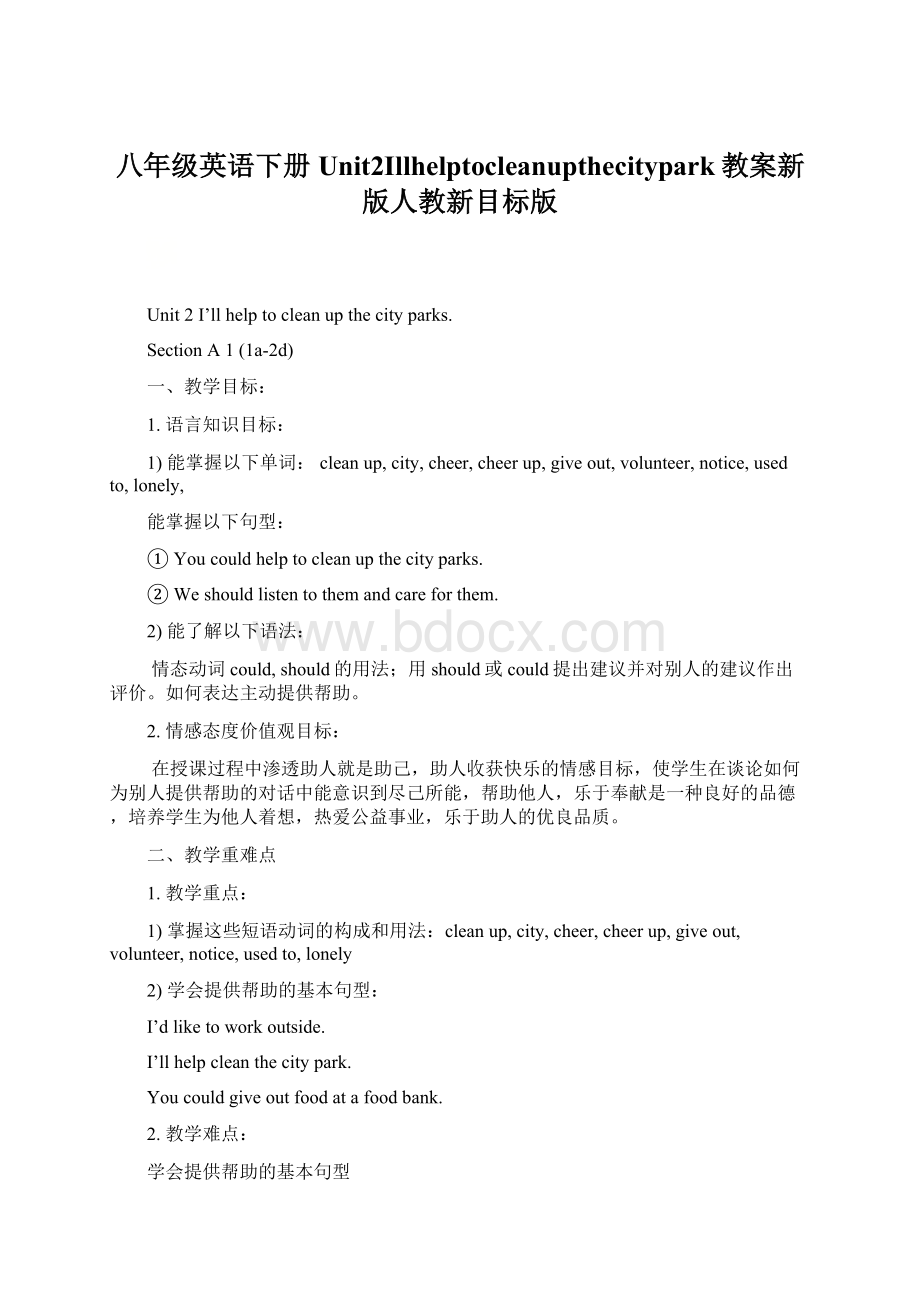八年级英语下册Unit2Illhelptocleanupthecitypark教案新版人教新目标版.docx
《八年级英语下册Unit2Illhelptocleanupthecitypark教案新版人教新目标版.docx》由会员分享,可在线阅读,更多相关《八年级英语下册Unit2Illhelptocleanupthecitypark教案新版人教新目标版.docx(28页珍藏版)》请在冰豆网上搜索。

八年级英语下册Unit2Illhelptocleanupthecitypark教案新版人教新目标版
Unit2I’llhelptocleanupthecityparks.
SectionA1(1a-2d)
一、教学目标:
1.语言知识目标:
1)能掌握以下单词:
cleanup,city,cheer,cheerup,giveout,volunteer,notice,usedto,lonely,
能掌握以下句型:
①Youcouldhelptocleanupthecityparks.
②Weshouldlistentothemandcareforthem.
2)能了解以下语法:
情态动词could,should的用法;用should或could提出建议并对别人的建议作出评价。
如何表达主动提供帮助。
2.情感态度价值观目标:
在授课过程中渗透助人就是助己,助人收获快乐的情感目标,使学生在谈论如何为别人提供帮助的对话中能意识到尽己所能,帮助他人,乐于奉献是一种良好的品德,培养学生为他人着想,热爱公益事业,乐于助人的优良品质。
二、教学重难点
1.教学重点:
1)掌握这些短语动词的构成和用法:
cleanup,city,cheer,cheerup,giveout,volunteer,notice,usedto,lonely
2)学会提供帮助的基本句型:
I’dliketoworkoutside.
I’llhelpcleanthecitypark.
Youcouldgiveoutfoodatafoodbank.
2.教学难点:
学会提供帮助的基本句型
三、教学过程
Step1Newwords
1.noticen.公告牌;通告;布告
e.g.Pleasereadthelistonthenoticeboard.请读公告板上的名单。
2.signn.标志;信号
e.g.Lookaround,wecouldseenosignoflife.
环顾四围,我们看不出一点生命的迹象。
3.volunteerv.义务劳动,自愿做volunteertodosth.义务自愿做某事
e.g.Manypeoplevolunteertoworkonthefarm.很多人志愿到农场去工作。
4.cleanup打扫;清除
e.g.Thestudentstaketurnstocleanuptheircampus.学生们轮流打扫校园。
5.giveout分发;散发
e.g.Pleasehelpmegiveoutfood.请帮我将吃的发下去。
6.cheerv.欢呼;喝彩
e.g.Cheerup.Thenewsisn’ttoobad.振作起来,消息还不算太坏。
7.lonelyadj.孤独的;寂寞的
e.g.Idon’tfeellonelybecauseImadenewfriendshere.
我不觉得孤独因为我交了新朋友。
8.usedto曾经,过去
e.g.Jackusedtobeshort,butnowhe’stall.杰克过去很矮,但现在高了。
Step2Warmingup
1.根据图片内容填空。
2.播放青年志愿者之歌视频,通过询问他们以下问题来引导学生们了解社会上一些的志愿们进行的活动。
T:
Whatisavolunteer?
S:
Avolunteer issomeonewhodoesworkwithoutbeingpaidforit,becausethey
wanttodoit.
T:
Whoshouldwehelp?
S:
…
T:
Howcouldwehelppeople?
S1:
Wecouldcleanuptheparks
S2:
Wecouldhelpsickpeopleinthehospital.
S3:
Wecouldhelpplanttrees.
…
Step3Discussion
1.1a.Lookatthewaysyoucouldhelpothers.Thenlistotherways.
2.Ssdiscusswiththeirpartnersandwritethewaysonecouldhelpothers:
①helptoplanttreesbytheriver.
②teachingkidsinasportorhobby
③helpingdisabled/elderlypeoplewithchores/shopping
④helpthetrafficpolice.
Step4Listening
1.T:
TellSstoreadthesentencesinthechart.Makesuretheyknowthemeaningofthesentences.
2.1b.PlaytherecordingfortheSstolistenandnumberthewaystheboyandgirlcouldhelpothers.
___Thegirlcouldvisitthesickkidsinthehospitaltocheerthemup.
___Theboycouldgiveoutfoodatthefoodbank.
___Thegirlcouldvolunteerinanafter-schoolstudyprogramtoteachkids.
___Theboycouldhelptocleanupthecityparks.
(Key:
3,2,4,1)
Step5Pairwork
1.LetSsreadtheconversationinthepicture.
2.1c.Usetheinformationinthechartof1btomakeotherconversations.
A:
Ihopetoworkoutside.
B:
Youcouldhelptocleanupthecityparks.
……
3.Letsomepairsactouttheirconversations.
Step6Listening
1.2a:
T:
AgroupofstudentsareplanningaCityParkClean-upDay.Listenandcheck(√)thethingstheyaregoingtodototellpeopleaboutit.
1.Lookatthepicturesin2a.Discussthethingstheyaregoingtodo.
2.PlaytherecordingfortheSstolistenandcheckthepictures.
3.Playtherecordingagaintochecktheanswers.
Answers:
b,c,e
2.2b:
1.LetSsreadthesentencesbelow.ExplainsomemainsentencesfortheSs.Makesuretheyknowwhattodo.
2.PlaytherecordingfortheSstowritethecorrectwordsintheblanks.
1.Weneedto____________aplantotellpeopleaboutthecityparkclean-up.
2.Clean-upDayisonlytwoweeksfromnow.Wecan’t______makingaplan.
3.Wecould______signs.
4.Let’smakesomenotices,too.ThenI’ll____them____afterschool.
5.Wecouldeach_______10studentsandaskthemtocome.
3.Playtherecordingagaintochecktheanswers.
Answers:
1.comeupwith2.putoff3.putup4.hand,out5.callup
Step7Pairwork
1.2c.TellSstomakeaconversationusingtheinformationin2aand2b.
2.Letonepairtoreadouttheirconversationfirst.
e.g.
A:
WeneedtocomeupwithaplanfortheCityParkClean-UpDay.
B:
Let’shavelunchfirst.
A:
No,weneedtostartnow.Clean-UpDayisonlytwoweeksfromnow.
B:
You’reright.Wecan’tputoffmakingaplan.Aswetalk,I’llwritedownallourideas.Thenwecandecidewhichideasarebest.
A:
Let’smakesomenotices,too.ThenI’llhandthemoutafterschool.
B:
Andwecouldeachcalluptenstudentsandaskthemtocome.
3.Ssacttheconversationinpairs.Asksomepairstoactouttheirconversations.
Step8ReadingandRole-play
1.Readtheconversationsandanswerthetwoquestions:
①Where’sHelengoingtoworkthissummer?
__________________________________
②WhatdidTomdotohelptheoldpeople?
____________________________________
Answers:
She’sgoingtoworkinanoldpeople’shome.
Readingthenewspaperorjusttalkingtotheoldpeople.
2.Readtheconversationaftertheteacher.
3.Practicetheconversationwiththeirpartner.Thenletsomepairstoactouttheconversation.
Step9Languagepoints
1.Visitsickchildreninthehospital.
1)sick和ill两个形容词都有“生病的”意思,在用法上有一些相同的地方,有时可以互换,但仍有许多不同之处。
两者最大的区别在于当ill作“生病的”之意解时,多与系动词be,feel,become,fall,get,betaken等搭配,用作表语,较少用在名词前面作定语。
e.g.Davewasso______thathehadtostayinbedforamonthatleast.ill
戴夫病的厉害,至少需要卧床一个月。
当用在名词前作定语表达“生病的”意思时,人们更多使用sick。
e.g.Dianaspentmonthslookingafterher________mother.sick
戴安娜花数月照顾她生病的母亲。
2)此处inthehospital意为“住院”,是美语用法。
在英国,人们则多说inhospital。
与之相类似的还有:
gotothehospital和gotohospital。
2.Theytoldmestoriesaboutthepastandhowthingsusedtobe.
usedto过去……;过去常常……
e.g.IusedtoliveinLondon.我曾经住在伦敦。
We’reeatingoutmoreoftenthanweusedto.
我们最近外出吃饭的次数比以前要高出许多。
usedto的否定结构多为didn’tuseto。
人们也说usednotto,我们也可用never来强调否定usedto。
e.g.TheyneverusedtoaskwhereI’dbeen.
他们过去对我去了哪里从不过问。
在问句中,人们习惯用did…useto结构。
e.g.Didyouusetostudyinthisbuilding?
你过去就曾在这栋楼里学习吗?
3.Yeah,alotofoldpeoplearelonely.
lonelyadj.孤独的;寂寞的指精神上感觉孤独、寂寞。
e.g.Inthenewcity,theoldmanfeelslonely.在这个新城市,老人觉得很孤独。
4.WeneedtocomeupwithaplanfortheCityParkClean-upDay.
need用作实义动词,有“必要”、“必需”之意,有人称、数和时态的变化,可以接名词、代词、动名词或带to的动词不定式作宾语。
e.g.ThemanneedsanEnglishdictionarywhenheworks.
这个人在工作时需要一本英语词典。
Doyouneedtoseehimyourself?
你必需亲自见他吗?
cleanup意为“打扫;清理”。
但如果在clean和up间加个连字符号,它就是名词了,意为“扫除”。
e.g.Youmustgiveyourclassroomagoodclean-up.你必须对教室进行彻底地打扫。
comeupwith提出(观点,看法)。
【练习】翻译下列句子。
1)他想出了一个绝好的办法。
Hehas comeupwith agreatidea.
2)我提供了一个更换的计划来帮助他。
Icameupwithabetterplantohelphim.
Step10Exercises
Ⅰ. 根据句意及括号内所给单词的提示填空。
1.Maryistellinganinterestingstory________(cheer)upherbrother.
2.Onweekendsmyyoungersister________(volunteer)inthehospital.
3.Followtheroadandyou’llsee________(sign)fortheturn-off(支路).
4.Therewerelotsof________(notice)onthenoticeboard(布告板).
5.Ifeelmuch________(lonely)herethanIwasinTaiyuan.
Ⅱ. 根据语境,从方框中选择恰当的短语填空,有的需要变换形式。
cleanup,callup,putoff,usedto,handout
1.—Theydecidedto____________themeetingjustnow.
—Really?
Thenwhenwilltheyhavethemeeting?
2.IknowalotaboutthisvillagebecauseI____________livehere.
3.Aftertheparty,ittookusanhourto____________thehall.
4.WhenIcameintotheclassroom,IsawMs.Lin____________exampapers.
5.Joe,____________Mr.Smithintheevening.Here’shisphonenumber.
Keys:
Ⅰ.1.tocheer2.volunteers3.signs4.notices5.lonelier/morelonely
Ⅱ.1.putoff2.usedto3.cleanup4.handingout5.callup
Homework:
Writethreeconversationsaboutyourdiscussionswithyourclassmates.
A:
I’dliketohelptheold.WhatcouldIdo?
B:
Youcouldgivethemmedicalservice.
SectionA2(3a-3c)
一、教学目标:
1.语言知识目标:
1)学习掌握下列词汇:
several,feeling,satisfaction,joy,owner,journey
2)阅读短文,能按要求找到相应的信息。
3)通过阅读提高学生们的阅读能力。
4)了解世界各地的学生们都进行哪些志愿活动。
2.情感态度价值观目标:
使学生在谈论如何为别人提供帮助的对话中能意识到尽己所能,帮助他人,乐于奉献是一种良好的品德,培养学生为他人着想,热爱公益事业,乐于助人的优良品质。
二、教学重难点
1.教学重点:
1)掌握本部分出现的生词和词组,达到熟练运用的目标。
2)阅读短文,获得相关的信息。
通过阅读练习,来提高阅读能力。
2.教学难点:
1)阅读短文,获得相关的信息的能力。
2)理解并运用所学的词汇及表达方式。
三、教学过程
Step1Revision
1.Writedownthephrases.
1.打扫________
2.分发________
3.曾经_______
4.(使)变得高兴________
5.义务做某事_________________
6.大打扫日______________
7.想出主意(办法)____________
Answers:
cleanup,giveout,usedto,cheerup,volunteertodosth.Clean-UpDay,comeupwith
2.Role-play
A:
Hi,Tom.I’mmakingsomeplanstoworkinanoldpeople’shomethissummer.
B:
Really?
Ididthatlastsummer!
……
Step2Newwords
1.severalpron.adj.(=some)几个;数个;一些
2.feelingn.感触;感觉;感情;feel(v.)+ingfeeling
e.g.Hehadtolowerhisvoicetocontrolhisfeeling.
他不得不压低声音来控制自己的感情。
3.satisfactionn.满足;满意
e.g.Lookingatabeautifulpaintingalwaysgivesonesatisfaction.
观看一幅美丽的图画总会使人心满意足。
4.joyn.高兴;愉快
e.g.It’sdifficulttodescribemyjoyinwords.
难以用语言来描述我的快乐。
5.ownern.物主;主人
e.g.Theydecidedtogivethecatbacktotheowner.
他们决定将猫归还它的主人。
6.journeyn.旅行;旅程
e.g.Athousand-lijourneybeginswiththefirststep.
千里之行始于足下。
Step3Warmingup
1.Watchavideoandanswerthequestions.
1.Whatdopeoplethinkaboutvolunteers?
2.Whatkindsofworkcanvolunteersdo?
3.Whatdoyouusuallydoonyourfreetime?
Wouldyouliketovolunteertodoanythingforothers?
Sstrytoanswerthequestions:
1.Theythinkhighlyoftheworkofvolunteers.
2.Donatingclothes/foodtopeoplewhoneedthem;helptheold/disablepeople;teachingkids…
Step4Reading
1.3a:
1.TellSstoreadthearticlein3aquicklyandtrytofindthea